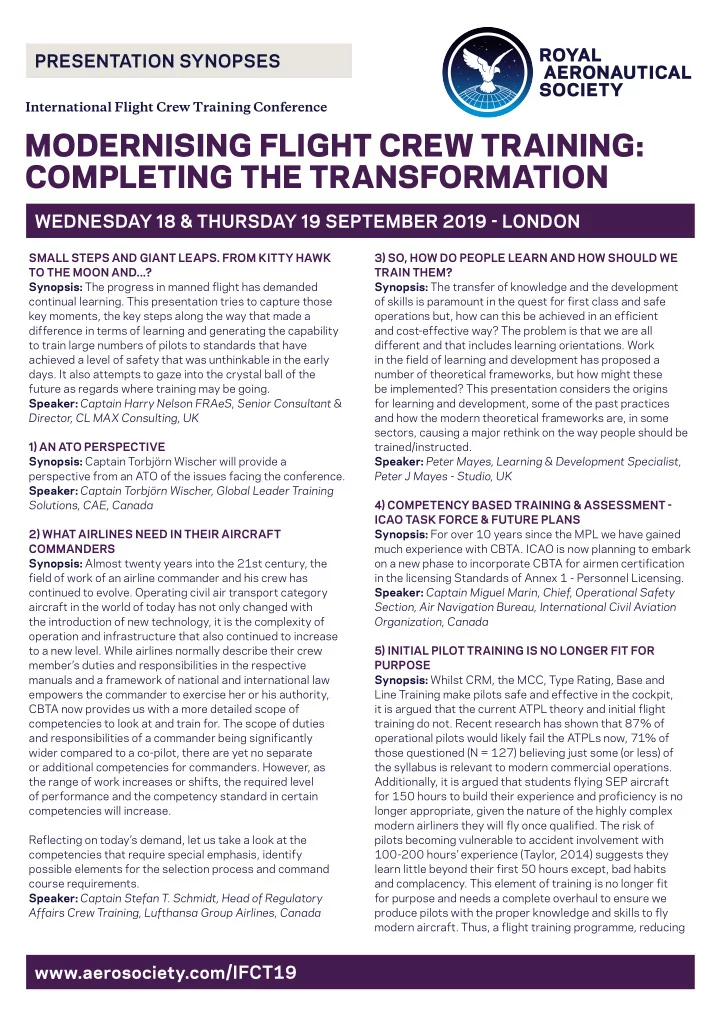

PRESENTATION SYNOPSES International Flight Crew Training Conference MODERNISING FLIGHT CREW TRAINING: COMPLETING THE TRANSFORMATION WEDNESDAY 18 & THURSDAY 19 SEPTEMBER 2019 - LONDON SMALL STEPS AND GIANT LEAPS. FROM KITTY HAWK 3) SO, HOW DO PEOPLE LEARN AND HOW SHOULD WE TO THE MOON AND...? TRAIN THEM? Synopsis: The progress in manned flight has demanded Synopsis: The transfer of knowledge and the development continual learning. This presentation tries to capture those of skills is paramount in the quest for first class and safe key moments, the key steps along the way that made a operations but, how can this be achieved in an efficient difference in terms of learning and generating the capability and cost-effective way? The problem is that we are all to train large numbers of pilots to standards that have different and that includes learning orientations. Work achieved a level of safety that was unthinkable in the early in the field of learning and development has proposed a days. It also attempts to gaze into the crystal ball of the number of theoretical frameworks, but how might these future as regards where training may be going. be implemented? This presentation considers the origins Speaker: Captain Harry Nelson FRAeS, Senior Consultant & for learning and development, some of the past practices Director, CL MAX Consulting, UK and how the modern theoretical frameworks are, in some sectors, causing a major rethink on the way people should be 1 ) AN ATO PERSPECTIVE trained/instructed. Synopsis: Captain Torbjörn Wischer will provide a Speaker: Peter Mayes, Learning & Development Specialist, perspective from an ATO of the issues facing the conference. Peter J Mayes - Studio, UK Speaker: Captain Torbjörn Wischer, Global Leader Training Solutions, CAE, Canada 4) COMPETENCY BASED TRAINING & ASSESSMENT - ICAO TASK FORCE & FUTURE PLANS 2) WHAT AIRLINES NEED IN THEIR AIRCRAFT Synopsis: For over 10 years since the MPL we have gained COMMANDERS much experience with CBTA. ICAO is now planning to embark Synopsis: Almost twenty years into the 21st century, the on a new phase to incorporate CBTA for airmen certification field of work of an airline commander and his crew has in the licensing Standards of Annex 1 - Personnel Licensing. continued to evolve. Operating civil air transport category Speaker: Captain Miguel Marin, Chief, Operational Safety aircraft in the world of today has not only changed with Section, Air Navigation Bureau, International Civil Aviation the introduction of new technology, it is the complexity of Organization, Canada operation and infrastructure that also continued to increase to a new level. While airlines normally describe their crew 5) INITIAL PILOT TRAINING IS NO LONGER FIT FOR member’s duties and responsibilities in the respective PURPOSE manuals and a framework of national and international law Synopsis: Whilst CRM, the MCC, Type Rating, Base and empowers the commander to exercise her or his authority, Line Training make pilots safe and effective in the cockpit, it is argued that the current ATPL theory and initial flight CBTA now provides us with a more detailed scope of competencies to look at and train for. The scope of duties training do not. Recent research has shown that 87% of and responsibilities of a commander being significantly operational pilots would likely fail the ATPLs now, 71% of wider compared to a co-pilot, there are yet no separate those questioned (N = 127) believing just some (or less) of or additional competencies for commanders. However, as the syllabus is relevant to modern commercial operations. the range of work increases or shifts, the required level Additionally, it is argued that students flying SEP aircraft of performance and the competency standard in certain for 150 hours to build their experience and proficiency is no competencies will increase. longer appropriate, given the nature of the highly complex modern airliners they will fly once qualified. The risk of Reflecting on today’s demand, let us take a look at the pilots becoming vulnerable to accident involvement with competencies that require special emphasis, identify 100-200 hours’ experience (Taylor, 2014) suggests they possible elements for the selection process and command learn little beyond their first 50 hours except, bad habits course requirements. and complacency. This element of training is no longer fit Speaker: Captain Stefan T. Schmidt, Head of Regulatory for purpose and needs a complete overhaul to ensure we Affairs Crew Training, Lufthansa Group Airlines, Canada produce pilots with the proper knowledge and skills to fly modern aircraft. Thus, a flight training programme, reducing www.aerosociety.com/IFCT19
Recommend
More recommend